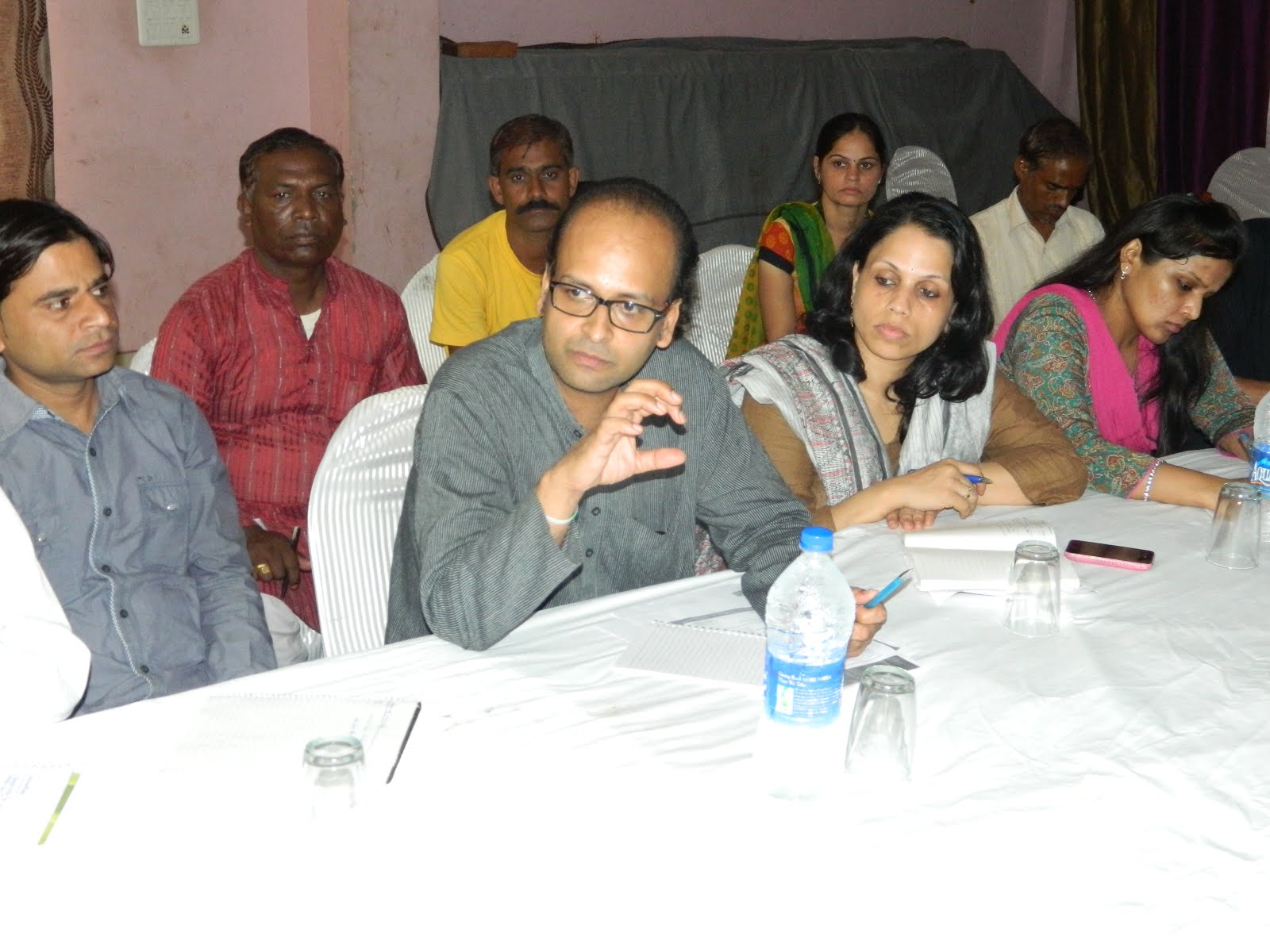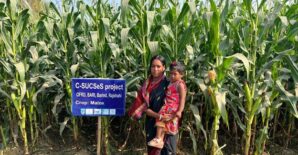Shivpuri District, Madhya Pradesh, 5 August 2013 A knowledge mobilization meeting with district and block-level officials of the Women and Child Development Department in Shivpuri, Madhya Pradesh, has led to the recognition of the value of establishing a knowledge sharing platform to share concerns, issues and solutions among this peer group.
Vikas Samvad, a POSHAN knowledge mobilization partner, organized a meeting of the Child Development Project Officers (CDPOs) in Shivpuri, Madhya Pradesh, to gain a better understanding of their activities, identify their information and knowledge needs and discuss peer networks and knowledge sharing. The meeting was attended by roughly 35 participants (CDPOs and Senior Supervisors) from the Department of Women and Child Development (WCD).
The group recognized that the various national and international level studies in the field of malnutrition aren’t feeding through to the program implementers at the frontline, in part because the actors at the district, block, and village-level are too busy dealing with operational issues. ‘The very noise on the status of malnutrition at the national level hardly reaches us or concerns us as we are too busy with our own operational issues …’ said one of the Child Development Project Officer (CDPO) at the first meeting of the district level officials of the Department of Women and Child Development (WCD) at Shivpuri District of Madhya Pradesh on 5th August 2013.
The participants identified many issues that they faced during implementation of the schemes and programs. These included: low education levels of the Anganwadi Workers (AWWs); lack of clarity in filling out certain sections of the Monthly Progress Report (MPR) form; restricted allocation of funds for transport for Take Home Rations (THR) and cooked meals; THR being consumed by the entire family due to food insecurity, rather than by the child alone; no training provided to the cook; and the biggest issue, lack of convergence between government schemes. Lack of convergence causes many operational difficulties. Participants shared many examples of the same resources being used for the same purpose, but under different programs, due to the lack of convergence. In addition, the participants also noted that the recruitment policies for AWW must be revised, to ensure that decisions are based on the suitability of the candidate.
The persistent challenge of documentation was also raised by participants. The block-level participants noted that there were 12 registers to be filled by the AWWs and in many cases the AWW did not have adequate literacy skills, therefore training alone doesn’t help. Along with this, the format of registers and the focus of the programs appeared to keep changing. The officials noted that they found these changes difficult to adapt to, which provides some indication of the difficulties that the frontline workers like the AWWs face.
Ultimately, however, the participants recognized that there will likely always be such operational constraints, and that what were needed were solutions to enable them to deliver the tasks effectively. Knowledge-sharing across the district was identified as a possible solution that was feasible to implement without major policy changes.
The participants discussed their current knowledge sharing practice and mechanisms. In many cases the officials turn to their peers for advice on day-to-day operational issues, or approach senior staff. However, there is currently no systematic mechanism or platform to support access to new knowledge, provide solutions to queries and offer technical advice on how to deal with new interventions.
In closing, the workshop concluded that participants were facing several similar issues and suggested that there could be a significant benefit of a forum or platform to discuss these issues and to identify solutions at the local levels as well as follow-up actions at the state and national level. It was agreed that a knowledge network of the CDPOs and other district level officials could facilitate discussion of the ground-level issues and help to mobilize knowledge across the district. The network could also be useful for sharing new research findings and updates in the field of nutrition, and possibly even to generate knowledge to reach state and national level actors.
Vikas Samvad and IDS, another POSHAN knowledge mobilization partner, will now be exploring ways to take this plan forward.
Shivpuri District Level Meeting in Hindi
Vikas Samvad, a POSHAN knowledge mobilization partner, organized a meeting of the Child Development Project Officers (CDPOs) in Shivpuri, Madhya Pradesh, to gain a better understanding of their activities, identify their information and knowledge needs and discuss peer networks and knowledge sharing. The meeting was attended by roughly 35 participants (CDPOs and Senior Supervisors) from the Department of Women and Child Development (WCD).
The group recognized that the various national and international level studies in the field of malnutrition aren’t feeding through to the program implementers at the frontline, in part because the actors at the district, block, and village-level are too busy dealing with operational issues. ‘The very noise on the status of malnutrition at the national level hardly reaches us or concerns us as we are too busy with our own operational issues …’ said one of the Child Development Project Officer (CDPO) at the first meeting of the district level officials of the Department of Women and Child Development (WCD) at Shivpuri District of Madhya Pradesh on 5th August 2013.
The participants identified many issues that they faced during implementation of the schemes and programs. These included: low education levels of the Anganwadi Workers (AWWs); lack of clarity in filling out certain sections of the Monthly Progress Report (MPR) form; restricted allocation of funds for transport for Take Home Rations (THR) and cooked meals; THR being consumed by the entire family due to food insecurity, rather than by the child alone; no training provided to the cook; and the biggest issue, lack of convergence between government schemes. Lack of convergence causes many operational difficulties. Participants shared many examples of the same resources being used for the same purpose, but under different programs, due to the lack of convergence. In addition, the participants also noted that the recruitment policies for AWW must be revised, to ensure that decisions are based on the suitability of the candidate.
The persistent challenge of documentation was also raised by participants. The block-level participants noted that there were 12 registers to be filled by the AWWs and in many cases the AWW did not have adequate literacy skills, therefore training alone doesn’t help. Along with this, the format of registers and the focus of the programs appeared to keep changing. The officials noted that they found these changes difficult to adapt to, which provides some indication of the difficulties that the frontline workers like the AWWs face.
Ultimately, however, the participants recognized that there will likely always be such operational constraints, and that what were needed were solutions to enable them to deliver the tasks effectively. Knowledge-sharing across the district was identified as a possible solution that was feasible to implement without major policy changes.
The participants discussed their current knowledge sharing practice and mechanisms. In many cases the officials turn to their peers for advice on day-to-day operational issues, or approach senior staff. However, there is currently no systematic mechanism or platform to support access to new knowledge, provide solutions to queries and offer technical advice on how to deal with new interventions.
In closing, the workshop concluded that participants were facing several similar issues and suggested that there could be a significant benefit of a forum or platform to discuss these issues and to identify solutions at the local levels as well as follow-up actions at the state and national level. It was agreed that a knowledge network of the CDPOs and other district level officials could facilitate discussion of the ground-level issues and help to mobilize knowledge across the district. The network could also be useful for sharing new research findings and updates in the field of nutrition, and possibly even to generate knowledge to reach state and national level actors.
Vikas Samvad and IDS, another POSHAN knowledge mobilization partner, will now be exploring ways to take this plan forward.
Shivpuri District Level Meeting in Hindi




